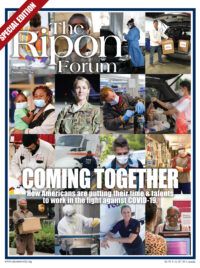
The food industry is no stranger to responding to crisis. With even a modicum of warning signs, grocers and their supply chain partners are often prepared to handle the natural disasters that sporadically but with increasing regularity take place across the country. We can track where a storm is going, predict where a fire is headed, or define the areas being affected by a drought. Knowing these things enables our industry to at least have a notion about the timing and the degree of the emergency, ensuring customers receive the necessities they need in times of crisis.
However, when it comes to responding to the national emergency brought by the COIVD-19 pandemic, the experience has been a truly novel one for the food industry. For the first time, we weren’t able to simply redirect supplies to one impacted region of the country. We couldn’t allocate extra human power to ensure stores reopened quickly to serve their neighborhoods. This national crisis impacted businesses and communities differently, and it stretched across the entire country.
Our industry rose to the occasion and managed the challenges that emerged during this national emergency and it continues to do so.
Despite these extraordinary obstacles, it’s in times of emergency that we realize the true resiliency of our supply chain. Our industry has worked around the clock to replenish and restock shelves, while ensuring the cleanliness of stores and the safety of its associates. Amid operational hurdles, the needs of all our customers – including Supplemental Nutrition Assistance Program (SNAP) and WIC shoppers – remained top-of-mind.
Our industry rose to the occasion and managed the challenges that emerged during this national emergency and it continues to do so. In real-time, grocers and their supply chain partners had to rewrite their playbooks on crisis response.
To heighten personal safety and engender a deeper comfort level among associates and shoppers, retailers employed various tactics in their stores to implement the critical protocol of maintaining safe social distances. For example, retailers marked six-foot intervals throughout their stores, installed safety screens when possible, limited the number of customers, turned some store aisles into one-way passage, reminded customers of social distancing via in-store announcements, and expanded pickup and delivery services when possible.
Our members are dedicated to protecting public health and as such have taken several measures to protect both their associates and customers. Grocers have closed their stores early for overnight cleaning and stocking and have utilized numerous hours of CDC-approved cleaning and sanitizing practices to sterilize high-touch surfaces throughout the day.
As the world continues to respond to the COVID-19 pandemic, there’s a more urgent need for online grocery shopping to reach all customers. Offering online ordering and payment for SNAP customers is an important step to address the evolving needs of U.S. grocery digital shoppers and guarantees we leave no customer unserved at this critical time. FMI is working closely with USDA to ensure any SNAP retailer who would like to and is able to participate can be authorized as an online SNAP retailer as swiftly as possible.
Additionally, product substitutions are a necessity even in programs such as WIC. A nationwide waiver would allow for replacements of products in the category and would help retailers and customers alike. For example, if the size and variety of WIC-eligible bread is sold out, mothers would have the opportunity to purchase comparable products, perhaps of a different size or brand instead.
41% of consumers are cooking more meals at home with 36% of shoppers reporting healthier eating habits compared to their habits before COVID-19 became a national concern.
Outside these operational and policy hurdles, retailers have had to respond to changes in the way Americans are eating and shopping. Quarantines, work requirements and medically induced isolation have challenged some families to find new ways of safely staying connected. In response, millions of Americans are cooking more and spending more family mealtime together because of the pandemic. According to FMI’s U.S. Grocery Shopper Trends COVID-19 tracker, 41% of consumers are cooking more meals at home with 36% of shoppers reporting healthier eating habits compared to their habits before COVID-19 became a national concern.
At a time when meaningful connections are more valuable than currency, family meals are confronting some new tests and trials, providing us all some new learning opportunities. Many have found their new work proficiency in conducting virtual meetings to pay off in some surprising ways with some families taking full tech-advantage of holding online meal get-togethers.
I am grateful for the leadership demonstrated by FMI’s member companies and the commitment of their dedicated workforce to ensure families have access to food during this unprecedented emergency. We know there will be many pressures on Congress when they return to session, but FMI would encourage an acknowledgement of our critically essential and dedicated workforce with both tax relief and limited liability protection to ensure unscrupulous plaintiff attorneys do not highjack the pandemic for their own enrichment.
Leslie Sarasin is the president and chief executive officer of FMI – The Food Industry Association.




